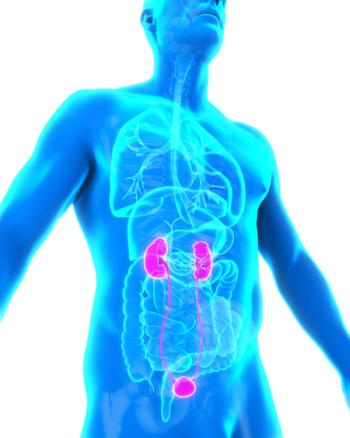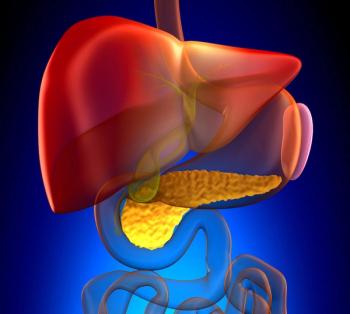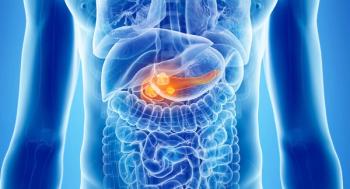
Pathologic complete response rates with the atezolizumab combination were higher for patients with PD-L1–negative disease in the phase 2 ATHENE trial.

Your AI-Trained Oncology Knowledge Connection!


Russ Conroy is an Associate Editor for CancerNetwork. He grew up in Hillsborough, New Jersey, and graduated from Rutgers University-New Brunswick in 2022.
On the weekends, he likes to unwind by playing video games with friends, tailgating at Rutgers football games with his family, or building his music collection with a visit to Princeton Record Exchange.

Pathologic complete response rates with the atezolizumab combination were higher for patients with PD-L1–negative disease in the phase 2 ATHENE trial.

Data highlight a need for randomized clinical trials to compare the efficacy and safety of VRD vs VTD in transplant-eligible multiple myeloma.

Data from the phase 3 STARGLO study support the CHMP’s recommendation for approving glofitamab plus gemcitabine/oxaliplatin in relapsed/refractory DLBCL.

Phase 2 data support the use of a modified quadruplet regimen omitting dexamethasone after 2 cycles in elderly transplant-ineligible multiple myeloma.

Prior data support the ability of PATHOMIQ_PRAD to predict patients at a high risk of biochemical recurrence and metastasis.

Factors such as World Health Organization status appeared to correlate with early mortality in an elderly non–small cell lung cancer cohort.

Data from the phase 3 ZIRCON study support the biologics license application for TLX250-CDx in clear cell renal cell carcinoma imaging.

Longer progression-free survival and more enduring responses occurred with avelumab/axitinib vs sunitinib in the phase 3 JAVELIN Renal 101 trial.

Treatment with mobocertinib produces clinically meaningful delays in time to deterioration among patients enrolled on the phase 3 EXCLAIM-2 trial.

Outcomes observed in the phase 3 EV-302 trial are “transformative” for most patients with advanced or metastatic urothelial carcinoma.

Data presented at 2025 ASCO GU reinforce the use of agents like nivolumab, cabozantinib, and darolutamide across different genitourinary malignancies.

Investigators will assess treatment with petosemtamab among patients with PD-L1–positive HNSCC in the phase 3 LiGeR-HN1 and LiGeR-HN2 trials.

Investigators of a phase 2 study will continue to assess long-term efficacy and quality-of-life outcomes in those who receive lenvatinib/pembrolizumab.

Data from RELATIVITY-047 show consistent benefits with nivolumab/relatlimab across most patient subgroups, including those with BRAF-mutated disease.

The safety profile of dato-DXd in the phase 1 TROPION-PanTumor01 trial is comparable with prior reports of the agent.

Prophylactic defibrotide conferred more ICU admissions and higher mortality among high-risk pediatric patients who underwent prior HSCT.

Data from the CheckMate 7FL trial may inform treatment decisions regarding preoperative immunotherapy for patients with breast cancer.

The 2025 Genitourinary Cancers Symposium will feature key updates in the management of different bladder, prostate, and kidney cancer populations.

Data from the ECHELON-3 trial support the approval of the brentuximab vedotin combo in relapsed/refractory B-cell lymphoma.

Findings from the phase 2b ReNeu trial support the approval of mirdametinib for patients with neurofibromatosis type 1-associated plexiform neurofibromas.

Adding panitumumab to sotorasib has yielded higher responses rates in KRAS G12C-mutated CRC compared with prior standards of care.

Risk model data may provide reassurance for individuals undergoing hormone therapy with an already heightened breast cancer risk due to family history.

Findings from RedirecTT-1 show responses across different dose levels of talquetamab/teclistamab among those with multiple myeloma.

Phase 2b data support the Regenerative Medicine Advanced Therapy designation for gemogenovatucel-T in newly diagnosed advanced ovarian cancer.

Data from analytical similarity studies and comparative clinical trials support the application of HLX11 in HER2-positive breast cancer.

Real-world data show that closer monitoring may be necessary for patients with relapsed/refractory multiple myeloma and baseline renal impairment.

Data support cetuximab/radiotherapy as a suitable option in carefully selected patients with HPV-negative squamous cell carcinoma of the head and neck.

Findings from the CheckMate 9DW trial support the CHMP’s recommendation for approving nivolumab/ipilimumab for those with unresectable HCC.

Data from 2025 ASCO GI support the potential role that combinations such as nivolumab/ipilimumab may play a part in managing different types of GI cancers.

Phase 3 data show that ITM-11 produced favorable safety results among patients with gastroenteropancreatic neuroendocrine tumors.